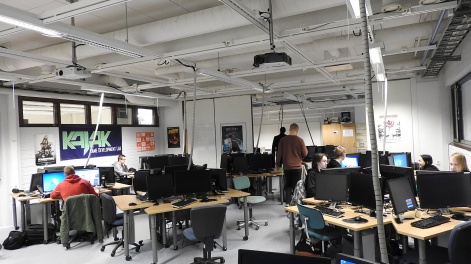Once a hotbed of game development start-ups, Finland's games industry growth is starting to slow down.
A report from Finnish games industry association Neogames published in April 2017 demonstrates this – there were just 50 new jobs created in the industry in 2016, compared to 200 in 2015 and 300 in 2014.
That puts the latest reported total number of people employed by the Finnish games industry at an estimated 2,750. 280 new jobs are expected to be created in 2017, but any closures and layoffs could mean there will not be this many extra people in the sector this year.
The slowdown has numerous explanations. Some studios didn't survive Finland's games boom and have had to shut down. Others have pivoted away from game development entirely as the space becomes too competitive.
Finland itself is also a relatively small country - its population sits at around 5.5 million overall, and so from a local games industry talent pool perspective could be maturing.
According to the developers themselves, one of the key issues for local studios is there aren't enough people with the right skills available to hire.
Can't get the staff
"There is huge competition among Finnish game developers to hire senior developers, especially Unity programmers," notes Veli-Pekka Piirainen, CEO of Critical Force Entertainment.
"The Finnish games industry is still quite young, and the pool of senior devs is small. The number of Finnish mobile game studios has risen quickly, so demand is also higher."
Teemu Mäki-Patola, COO of Badland developer Frogmind, agrees.
"The Finnish games industry has grown hugely during the last five to ten years," he says. "Lots of new people entered the industry. But the amount of seasoned, very experienced people is not massive yet.
"All in all, the need for seasoned talent is bigger than the current pool of existing talent."
Further afield
The need for seasoned talent is bigger than the current pool of existing talent.Teemu Mäki-Patola
Developers are working around this by hiring abroad – Neogames found that 18% of game development staff working at Finnish companies weren't originally from Finland.
This isn't necessarily a problem for some developers. Rovio's Executive VP of Games Wilhelm Taht is quite proud of the studio's diversity.
"We have a large amount of different nationalities at Rovio and I do want to say a quite healthy gender mix, which is something that we treat as very important, and I think is quite unique as well. It's a very good, healthy statistic I think," he says.
But while the bigger developers have the funds to hire from abroad if they so need – it's the smaller devs that are suffering from a lack of senior talent.
Children are the future
While it's true that many developers are looking to hire from abroad at the moment, some of these foreign employees have been around for some time.

"The Finnish games industry has hired a good number of foreign talents during the past few years. They may be international hires, but among them there are a lot of foreign students that came to Finland to study," explains Games Jobs Finland senior consultant Arja Martikainen.
"Some 10 years back many students came because of Finland's reputation in the area of mobile development, thanks to Nokia. More recently, there is an increasing number of students coming for design-related studies."
Finland's education system may be the key to solving the recruitment problem, as more universities start to offer courses which better cater to the needs of the games industry.
Better tailored courses mean students will be more prepared for the roles they're hired for, making them more attractive as a potential employee for a recruiter..
Closing the gap
It will take a couple of years before graduates have the required professional skill set.Veli-Pekka Piirainen
"The advantage with the majority of young graduates has been that they have some sort of portfolio to show," comments Martikainen.
"And schools have improved in the sense that they have organised workshop-type training that allows portfolio building."
Some developers are now working with universities to make sure their students get the education they really need. For example, Critical Force is setting up its own academy at Kajaani University to help give pupils the tools they need to succeed in the game development world.
"Kajaani is one of Finland's innovation hotbeds for games with many studios and the excellent game development curriculum at the Kajaani University of Applied Sciences," said Piirainen at the time of the announcement.
But there is still the worry that developers will overlook younger employees due to their lack of experience in the field.

Even Piirainen believes that "hiring game development graduates is quite easy, but it will take a couple of years before they have the required professional skill set".
Take a chance
Martikainen claims that this is why Finland is having an apparent of developers, as studios won't take a chance on a rookie.
Companies are not willing to take a risk and let someone less experienced try.Arja Martikainen
"The lack of work force is a bit of a myth since sometimes it seems that the companies are not willing to take a risk and let someone less experienced try," she says.
"If there are no seniors available, it is easier to train a rookie."
The solution seems to be patience. Developers need to wait for the education system to catch up with their requirements, and when it does, there will be plenty of potential employees eager to get their start in the industry.
But these same developers need to be more willing to take a chance on the younger developers and designers out there – after all, if no one is giving them the experience, how can they be expected to become senior staff?






















